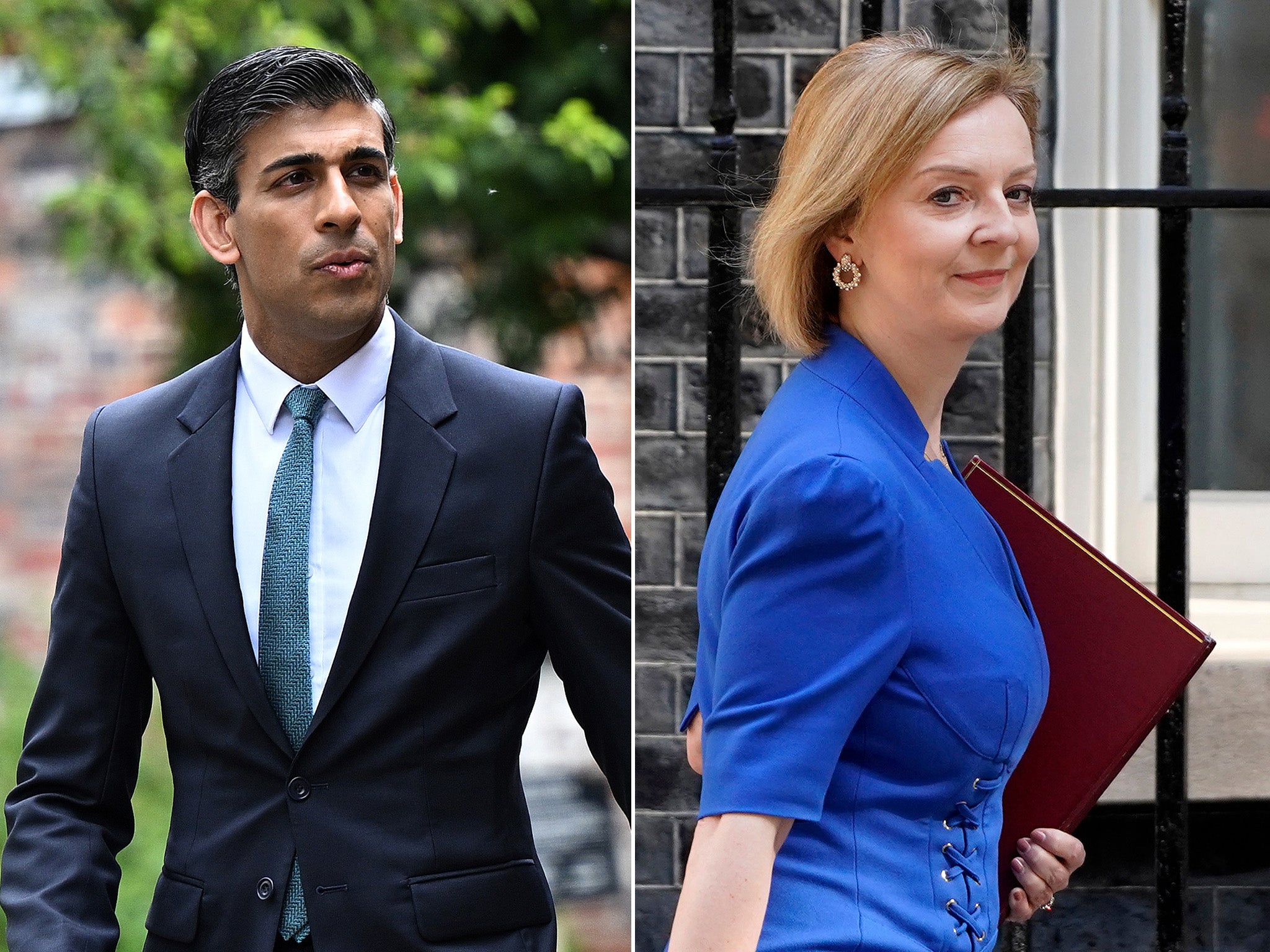‘Solidarity tax’ of 1% for all earners needed to raise more energy bill support, says think tank
Liz Truss and Rishi Sunak must ‘think the unthinkable’ and consider tax rise, says Resolution Foundation

Tory leadership hopefuls have been urged to reconsider their plans and bring in a “solidarity tax” of 1 per cent on all earners to help pay for extra support with soaring energy bills.
The Resolution Foundation said it was time for Liz Truss and Rishi Sunak – who have promised tax cuts – to “think the unthinkable” and raise tax during the worsening cost of living crisis.
The think tank said a 1 per cent hike in income tax on all rates – with 60 per cent paid by the wealthiest fifth of UK households – would raise £9.5bn a year for more support with gas and electricity bills.
The foundation also urged the next prime minister to work with the energy companies on creating a new “social tariff” to reduce bills for hard-pressed Britons on low and middle incomes.
It comes as consumer group Which? called on the next PM to raise the existing £400 energy bill discount by 150 per cent to £1,000 this autumn, or risk pushing millions of households into “financial distress”.
Despite growing fears of hardship ahead, the Sunak and Truss camps have both rejected Labour’s call a price cap freeze – and Scottish Power’s proposed £100bn fund allowing companies to freeze prices for two years.
Mr Sunak said he was “nervous and sceptical” about the Scottish Power plan for a state-backed fund to allow firms to access loans from commercial banks – a proposal supported by industry body Energy UK.
“We need to make sure that what we’re doing in response is not only affordable but also isn’t going to make inflation worse,” the Tory contest underdog told BBC Radio 4’s Today programme on Wednesday.
Defence minister James Heappey, a key Truss ally, said the fund could involve “eye-watering amounts of money”. He told Sky News: “I don’t think a universal freezing of everybody’s energy bills really helps to get taxpayers money to people who need it most.”
Mr Sunak has vowed to spend around £5bn on targeted support for the most vulnerable through the benefits system, but the contest favourite Ms Truss has yet to commit to any further direct payments.
The report published by the Resolution Foundation on Thursday said any extra support “should be targeted at those most exposed to rising bills” – but said neither Mr Sunak nor Ms Truss’s current plans were enough to meet the scale of the crisis.
Even an extra £650 payment would still fall £300 short of covering the higher-than-expected bills for many low-income households, the think tank warned – urging the candidates to consider widening targeted support beyond benefit recepients, as well as introducing a “solidarity” income tax hike and new social tariff.
Jonny Marshall, the Resolution Foundation’s senior economist, warned that a “catastrophe” was coming this winter as soaring energy bills risk “serious physical and financial damage”.
Calls for more help were bolstered by consumer group Which? on Thursday. The watchdog said the next PM should raise the existing, universal £400 energy rebate to £1,000 this autumn, or risk pushing millions of households into “financial distress”.
Which? warned that such an increase would still be insufficient for the poorest families, calling on government to provide a further, one-off payment of £150 to ensure the most vulnerable get through the winter.
The Child Poverty Action Group (CPAG) called on Thursday for at least an additional £1,500 for families with children and £700 more for households without children to cover their extra energy costs.
Warning that many families “perilously close” to poverty could “fall through the ice” without radical intervention, the CPAG also called for an 18 per cent rise in benefits in April.
The British Chamber of Commerce (BCC) also called for action to “protect businesses, livelihoods and jobs” in a letter to Boris Johnson, chancellor Nadhim Zahawi and both candidates for the Tory leadership.
The BCC urged politicians to consider Covid-style grant for small and medium-sized firms, a temporary cut in VAT to 5 per cent, and for Ofgem to be given more power to strengthen regulation.
When then-chancellor Sunak revealed a support package in May, the energy price cap was predicted to reach around £2,800 in the autumn. But analysts now predict that annual energy bills will increase to £3,554 in October, with an announcement by Ofgem on the exact figure expected on Friday.
Ahead of the big statement by the regulator, Labour repeated its call for the Tory candidates to back an expansion of the windfall tax on oil and gas giants to fund a price cap freeze.
“We are now less than 24 hours away from the energy price cap rising yet again, but we have heard no serious proposals from the Conservative leadership candidates,” said shadow climate secretary Ed Miliband. “We simply cannot allow the British people to suffer a further increase in energy bills.”
New research suggests more than 70 per cent of disabled households have already been plunged into debt this year by the cost of living crisis, with more than 80 per cent saying the government has not done enough to help.
Families caring for a child or adult with disabilities are “frustrated” at the lack of urgency from ministers over their increasing financial pressures, according to disability charity Sense.
Chief executive of Sense Richard Kramer warned of the “desperate everyday reality” disabled households forced to choose between eating and heating their homes, adding that the next PM “must” address the impact of the crisis on disabled households.




Join our commenting forum
Join thought-provoking conversations, follow other Independent readers and see their replies
Comments